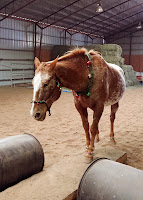Warning: This is a long blog post that is filled with interesting things.
On Tuesday I had my appointment with the education adviser to discuss my program. I'll skip the details, but instead of doing the K-6 concentration I will be doing the 1-8 concentration with a minor in psychology. This will cut my degree time down by a full year. Although the psychology minor will not give me any special bonuses on my salary (unlike a mathematics minor), I will get a lot of personal growth and information out of this minor that will help me understand and teach children better. Next semester I am taking 18 credits, but I am tentatively going to drop one. It depends on the course work for each class. I have three at campus and three online. 12 of the credits are psychology course work and the other 6 are elementary education classes. Next semester will be hard, there is no doubt about that. Hopefully I'll be able to manage my time better and enjoy the classes I am taking (unlike this semester). After next semester I will be on track with my degree! YAY!
So I went to the doctor on Wednesday to discuss how I've been feeling recently. I took a couple tests, talked a lot, cried...ha...I learned a lot of really interesting things pertaining to PTSD and its affects stress has on the brain. Here it is in a nutshell:
So when something happens in our lives, such as something traumatic or extremely stressful, we, as humans, learn to cope. More specifically speaking, however, a human's natural way of coping is to put that event into a place hidden away. My doctor used a fantastic metaphor to describe what I am going through. The stressful event is like a dragon. What do we do with dragons? We put them in the dungeon, of course! And for a while the dungeon holds the dragon and we think we have "conquered" this terrible beast. The dragon gets stronger though as it waits. Eventually the dragon starts breaking through the dungeon, so we add more spikes, concrete, and chains. Again we think we have handled the dragon and we can move on. Unfortunately, this is rarely the case. It could take years, but the dragon will once again become too strong for our dungeon and he will come out and try to take us down. Only now he is very angry for being locked away for so long and the repercussions are more severe.
With that being said and after talking to my doctor, it is safe to say that Foxy's death is the dragon in my life, as well as the trigger for my reaction to other stressers I encounter. I thought I was strong and took care of it, and I did...for the time being. But as more and more stressful things happened it became harder and harder to keep my dragon in its dungeon, and now he is almost free.
Interesting thing about the brain...when we do not handle stress effectively for a long period of time (usually due to a stressful/traumatic situation that triggered poor stress management), our brain adapts in order to function at the highest possible level. Basically what ends up happening is a neural pathway is created in our brain that handles all of the stress in our lives, no matter how big or small the stressor may be. This is when people begin having anxiety. My depression from Foxy's death had adapted into a generalized anxiety disorder. My brain is thinking that any stress is a "life threatening" situation and I need to either flight or fight in order to survive. Therefore, as this neural pathway was created, which was triggered by Foxy's death, it was being used more frequently with smaller stressors, like school, relationships, etc. It is now the major neural pathway in my brain for handling stress, which is why I am experiencing the panic, irrational thoughts, bad sleep, poor concentration, and so forth.
My doctor prescribed me a mild anti-depressant, which also acts as an anti-anxiety medication. It is a selective serotonin uptake inhibitor. I should begin noticing a difference in about a week, and know if I like it within three. She also prescribed me to speak with a social worker to help understand what I am experiencing and discuss proper stress management techniques for PTSD-like symptoms. I am meeting with my doctor on November 18 as a follow-up on the medication and therapy. She said this process will take anywhere from six months to a year, depending on how well my brain is able to block off the new neural pathway and start sending neurons to the correct places in the brain instead. No matter how long it takes, I am excited to feel better. Things make sense now. I have been strong so far, but I've learned it's okay to admit that I cannot be strong all the time.
 |
| Buck's beautiful (and noisy) costume. |
Here are pictures to describe the evening. They speak better than words.
 |
| Buck Not Having Fun. |
 | |
| Buck Having Fun. |
 |
| Happy, happy horse. My horse! |
Here is a series of pictures. If you're thinking about trying this with your own horse, it's important to note that the tail is brought up slowly. You'll know when the horse relaxes and gives you his tail. Don't force anything. The horse will tell you what he wants.




No comments:
Post a Comment